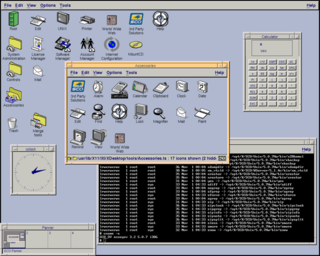Related Research Articles

Security-Enhanced Linux (SELinux) is a Linux kernel security module that provides a mechanism for supporting access control security policies, including mandatory access controls (MAC).
Virtual private network (VPN) is a network architecture for virtually extending a private network across one or multiple other networks which are either untrusted or need to be isolated.

Novell, Inc. was an American software and services company headquartered in Provo, Utah, that existed from 1980 until 2014. Its most significant product was the multi-platform network operating system known as Novell NetWare.

The SCO Group was an American software company in existence from 2002 to 2012 that became known for owning Unix operating system assets that had belonged to the Santa Cruz Operation, including the UnixWare and OpenServer technologies, and then, under CEO Darl McBride, pursuing a series of high-profile legal battles known as the SCO–Linux controversies.

NetWare is a discontinued computer network operating system developed by Novell, Inc. It initially used cooperative multitasking to run various services on a personal computer, using the IPX network protocol.
IPX/SPX stands for Internetwork Packet Exchange/Sequenced Packet Exchange. IPX and SPX are networking protocols used initially on networks using the Novell NetWare operating systems. They also became widely used on networks deploying Microsoft Windows LANs, as they replaced NetWare LANs, but are no longer widely used. IPX/SPX was also widely used prior to and up to Windows XP, which supported the protocols, while later Windows versions do not, and TCP/IP took over for networking.
Btrieve is a transactional database software product. It is based on Indexed Sequential Access Method (ISAM), which is a way of storing data for fast retrieval. There have been several versions of the product for DOS, Linux, older versions of Microsoft Windows, 32-bit IBM OS/2 and for Novell NetWare.

UnixWare is a Unix operating system. It was originally released by Univel, a jointly owned venture of AT&T's Unix System Laboratories (USL) and Novell. It was then taken over by Novell. Via Santa Cruz Operation (SCO), it went on to Caldera Systems, Caldera International, and The SCO Group before it was sold to UnXis. UnixWare is typically deployed as a server rather than a desktop. Binary distributions of UnixWare are available for x86 architecture computers. UnixWare is primarily marketed as a server operating system.
OpenVPN is a virtual private network (VPN) system that implements techniques to create secure point-to-point or site-to-site connections in routed or bridged configurations and remote access facilities. It implements both client and server applications.
Smoothwall is a Linux distribution designed to be used as an open source firewall. Smoothwall is configured via a web-based GUI and requires little or no knowledge of Linux to install or use.
In computer networks, a tunneling protocol is a communication protocol which allows for the movement of data from one network to another. It can, for example, allow private network communications to be sent across a public network, or for one network protocol to be carried over an incompatible network, through a process called encapsulation.

Xinuos OpenServer, previously SCO UNIX and SCO Open Desktop, is a closed source computer operating system developed by Santa Cruz Operation (SCO), later acquired by SCO Group, and now owned by Xinuos. Early versions of OpenServer were based on UNIX System V, while the later OpenServer 10 is based on FreeBSD 10. However, OpenServer 10 has not received any updates since 2018 and is no longer marketed on Xinuos's website, while OpenServer 5 Definitive and 6 Definitive are still supported.

Microsoft Forefront Threat Management Gateway, formerly known as Microsoft Internet Security and Acceleration Server, is a discontinued network router, firewall, antivirus program, VPN server and web cache from Microsoft Corporation. It ran on Windows Server and works by inspecting all network traffic that passes through it.
Open Enterprise Server (OES) is a server operating system published by OpenText. It was first published by Novell in March 2005 to succeed their NetWare product.

SUSE Linux Enterprise (SLE) is a Linux-based operating system developed by SUSE. It is available in two editions, suffixed with Server (SLES) for servers and mainframes, and Desktop (SLED) for workstations and desktop computers.

SUSE S.A. is a German multinational open-source software company that develops and sells Linux products to business customers. Founded in 1992, it was the first company to market Linux for enterprise. It is the developer of SUSE Linux Enterprise and the primary sponsor of the community-supported openSUSE Linux distribution project.

Linoma Software was a developer of secure managed file transfer and IBM i software solutions. The company was acquired by HelpSystems in June 2016. Mid-sized companies, large enterprises and government entities use Linoma's software products to protect sensitive data and comply with data security regulations such as PCI DSS, HIPAA/HITECH, SOX, GLBA and state privacy laws. Linoma's software runs on a variety of platforms including Windows, Linux, UNIX, IBM i, AIX, Solaris, HP-UX and Mac OS X.

Actian Zen is an ACID-compliant, zero-DBA, embedded, nano-footprint, multi-model, Multi-Platform database management system (DBMS). It was originally developed by Pervasive Software, which was acquired by Actian Corporation in 2013.

Endian Firewall is an open-source router, firewall and gateway security Linux distribution developed by the South Tyrolean company Endian. The product is available as either free software, commercial software with guaranteed support services, or as a hardware appliance.

IPFire is a hardened open source Linux distribution that primarily performs as a router and a firewall; a standalone firewall system with a web-based management console for configuration.
References
- ↑ "BorderManager FastCache". Novell. 1 November 1998. Retrieved 24 March 2010.
- ↑ "Good-bye NetWare, hello OES 2". Novell. 19 March 2007.
- ↑ Cool Solutions: Update on Novell BorderManager and Novell Security Manager by Astaro. Novell.com. Retrieved on 2014-05-23.
- ↑ "Updated Novell BorderManager Coming Q1 2007". Archived from the original on 2007-02-02. Retrieved 2007-03-12.
- ↑ Archived June 28, 2010, at the Wayback Machine
- ↑ Novell Support | Support Lifecycle. Support.novell.com (1970-01-01). Retrieved on 2014-05-23.